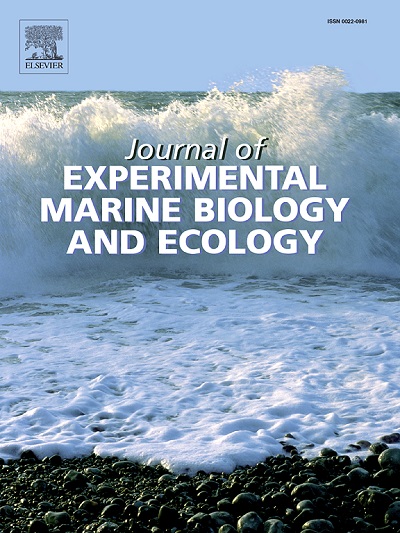Reduced predator avoidance behavior and higher exposure to thermal stress for prey during heat wave events
IF 1.8
3区 生物学
Q3 ECOLOGY
Journal of Experimental Marine Biology and Ecology
Pub Date : 2024-10-08
DOI:10.1016/j.jembe.2024.152060
引用次数: 0
Abstract
Heat wave events threaten natural communities by causing mass mortalities and altering species interactions. Some organisms can use behavioral thermoregulation to avoid extreme temperatures, which may buffer them against rising incidents of heat events. While behavioral thermoregulation is effective at avoiding stressful temperatures, less is known about how it can alter other adaptive behaviors like predator avoidance. In this study, we used laboratory and outdoor mesocosm experiments to understand how behavioral thermoregulation is impacted by the presence of local predators during heat wave events, by exposing intertidal marsh periwinkles (Littoraria irrorata) to simulated heat waves and cues from blue crabs (Callinectes sapidus). We measured snail climbing height and body temperatures to disentangle snail decisions to thermoregulate or avoid predators under increasing heat stress. Our results indicate that antipredator behavior can be severely reduced in heat wave simulations, in temperatures well below the snail's upper thermal limits. Snails chose lower climbing heights that allowed them to avoid stressful temperatures but brought them within reach of subtidal predators. Thus, while heat waves may not directly kill snails because they can behaviorally thermoregulate, reduction in antipredator response can increase their encounters with subtidal predators. Additionally, when snails maintained antipredator climbing behavior in lower intensity heat wave simulations, snails occupied hotter microclimates and had higher body temperatures, indicating predator avoidance increases the temperatures snails experience. Local predator presence can increase the exposure of prey species to temperature stress during heat events, and these events can decrease the size and number of tolerable microhabitats for mobile ectotherms.
在热浪事件中,捕食者的回避行为减少,猎物面临的热应力增加
热浪事件会造成大量死亡并改变物种间的相互作用,从而威胁自然群落。一些生物可以利用行为体温调节来避开极端温度,这可能会使它们在热事件不断增加的情况下得到缓冲。虽然行为体温调节能有效地避免应激性温度,但人们对它如何改变其他适应行为(如躲避捕食者)却知之甚少。在这项研究中,我们利用实验室和室外中型宇宙实验,通过让潮间带沼泽蠕螺(Littoraria irrorata)暴露于模拟热浪和蓝蟹(Callinectes sapidus)的提示下,来了解在热浪事件中,行为体温调节如何受到当地捕食者的影响。我们测量了蜗牛的攀爬高度和体温,以厘清蜗牛在热应力不断增加的情况下进行体温调节或躲避捕食者的决定。我们的结果表明,在热浪模拟中,当温度远低于蜗牛的热上限时,蜗牛的反捕食行为会严重减少。蜗牛选择了较低的攀爬高度,这使它们能够避开应激温度,但也使它们能够接近潮下带的捕食者。因此,虽然热浪可能不会直接杀死蜗牛,因为它们可以通过行为进行体温调节,但抗捕食者反应的降低会增加它们与潮下带捕食者的遭遇。此外,当蜗牛在强度较低的热浪模拟中保持反捕食者攀爬行为时,蜗牛占据了更热的微气候,体温也更高,这表明捕食者的回避会增加蜗牛所经历的温度。当地捕食者的存在会增加被捕食物种在高温事件中受到的温度胁迫,这些事件会减少移动的外温动物可忍受的微生境的大小和数量。
本文章由计算机程序翻译,如有差异,请以英文原文为准。
求助全文
约1分钟内获得全文
求助全文
来源期刊
CiteScore
4.30
自引率
0.00%
发文量
98
审稿时长
14 weeks
期刊介绍:
The Journal of Experimental Marine Biology and Ecology provides a forum for experimental ecological research on marine organisms in relation to their environment. Topic areas include studies that focus on biochemistry, physiology, behavior, genetics, and ecological theory. The main emphasis of the Journal lies in hypothesis driven experimental work, both from the laboratory and the field. Natural experiments or descriptive studies that elucidate fundamental ecological processes are welcome. Submissions should have a broad ecological framework beyond the specific study organism or geographic region.
Short communications that highlight emerging issues and exciting discoveries within five printed pages will receive a rapid turnaround. Papers describing important new analytical, computational, experimental and theoretical techniques and methods are encouraged and will be highlighted as Methodological Advances. We welcome proposals for Review Papers synthesizing a specific field within marine ecology. Finally, the journal aims to publish Special Issues at regular intervals synthesizing a particular field of marine science. All printed papers undergo a peer review process before being accepted and will receive a first decision within three months.

 求助内容:
求助内容: 应助结果提醒方式:
应助结果提醒方式:


